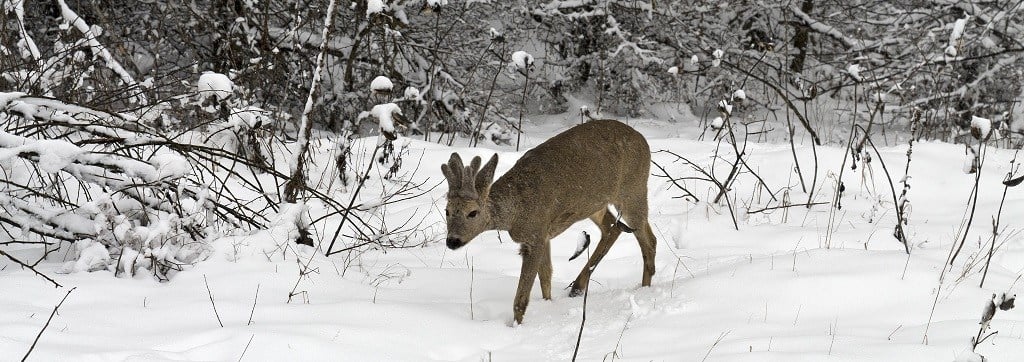I used to think domesticated animals do not understand the world they live in but that wild animal do. For instance, a dog or cat may not understand the danger of chewing on electrical wires, or the danger that moving vehicles present to them, or the danger of getting out of the house and roaming the neighborhood without paying attention to where they are going, which could result in them getting lost.
But domesticated animals aren't alone in not understanding the world they live in because there are many things wild animals don't understand about the natural world. A lot of the time they get stuck in mud or on a broken off sheet of ice or they fall through thin ice and in most cases, these predicaments they find themselves in are due to a failure to understand the risks of what they are doing. Also, it seems that some species have never had to deal with certain things and their brains have not evolved to process them at all. One example of this is shown in a scene in the 2019, 8 episode, Our Planet series narrated by David Attenborough on Netflix.
There is a place where walruses have always shown up at a certain time of year to fish. Normally there is ice everywhere for them to sleep on but this year there is no ice due to global warming so they are forced to sleep on rocky outcrops, but there is not nearly enough land to accommodate all of them so they are piled on top of each other and many are getting crushed to death. To escape this, several ascend this high, steep rocky outcrop and go to sleep on the top of it. Then when it is time to go back into the water to fish, they casually walk off the edge of the cliff to get back into the water, which results in them falling from a great height to the rocks below where they slowly die from hunger, thirst and their internal injuries.
Many animal species understand the danger of cliffs but walruses are not one of them. So walruses could use our help in this area. We are technically capable of making platforms for them to sleep on and blocking off these steep outcrops so that walruses cannot ascend them. Working on something like this, helping walruses in the wild, is as worthwhile a pursuit as some of the single issue campaigns that animal advocates work on. But for some reason, we tend to think of wild animals only in terms of conservation and ignore the suffering of individual wild animals.
As far as conservation status, walruses are classified Vulnerable, which is not as bad as Endangered or Critically Endangered, so a few hundred walruses walking off the edge of a cliff is negligible, but from the standpoint of compassion and animal welfare it's a tragedy.
So the study of how to help wild animals in terms of reducing their suffering rather than just being concerned with their population densities is known as welfare biology and it is vital. You can read more about it here:

 www.animal-ethics.org
www.animal-ethics.org
And here from the same website are some of the ways we currently intervene in nature to help wild animals:

 www.animal-ethics.org
www.animal-ethics.org
But domesticated animals aren't alone in not understanding the world they live in because there are many things wild animals don't understand about the natural world. A lot of the time they get stuck in mud or on a broken off sheet of ice or they fall through thin ice and in most cases, these predicaments they find themselves in are due to a failure to understand the risks of what they are doing. Also, it seems that some species have never had to deal with certain things and their brains have not evolved to process them at all. One example of this is shown in a scene in the 2019, 8 episode, Our Planet series narrated by David Attenborough on Netflix.
There is a place where walruses have always shown up at a certain time of year to fish. Normally there is ice everywhere for them to sleep on but this year there is no ice due to global warming so they are forced to sleep on rocky outcrops, but there is not nearly enough land to accommodate all of them so they are piled on top of each other and many are getting crushed to death. To escape this, several ascend this high, steep rocky outcrop and go to sleep on the top of it. Then when it is time to go back into the water to fish, they casually walk off the edge of the cliff to get back into the water, which results in them falling from a great height to the rocks below where they slowly die from hunger, thirst and their internal injuries.
Many animal species understand the danger of cliffs but walruses are not one of them. So walruses could use our help in this area. We are technically capable of making platforms for them to sleep on and blocking off these steep outcrops so that walruses cannot ascend them. Working on something like this, helping walruses in the wild, is as worthwhile a pursuit as some of the single issue campaigns that animal advocates work on. But for some reason, we tend to think of wild animals only in terms of conservation and ignore the suffering of individual wild animals.
As far as conservation status, walruses are classified Vulnerable, which is not as bad as Endangered or Critically Endangered, so a few hundred walruses walking off the edge of a cliff is negligible, but from the standpoint of compassion and animal welfare it's a tragedy.
So the study of how to help wild animals in terms of reducing their suffering rather than just being concerned with their population densities is known as welfare biology and it is vital. You can read more about it here:

Welfare biology — Animal Ethics
Welfare biology can be defined as the study of living beings and their environment with respect to wellbeing, and could represent a distinct approach to the study of the lives of animals in their ecosystems.
 www.animal-ethics.org
www.animal-ethics.org
And here from the same website are some of the ways we currently intervene in nature to help wild animals:

Helping animals in the wild
Animals face significant harms in the wild. Fortunately, though, there are many ways we can help them, but we need to raise awareness about this.

